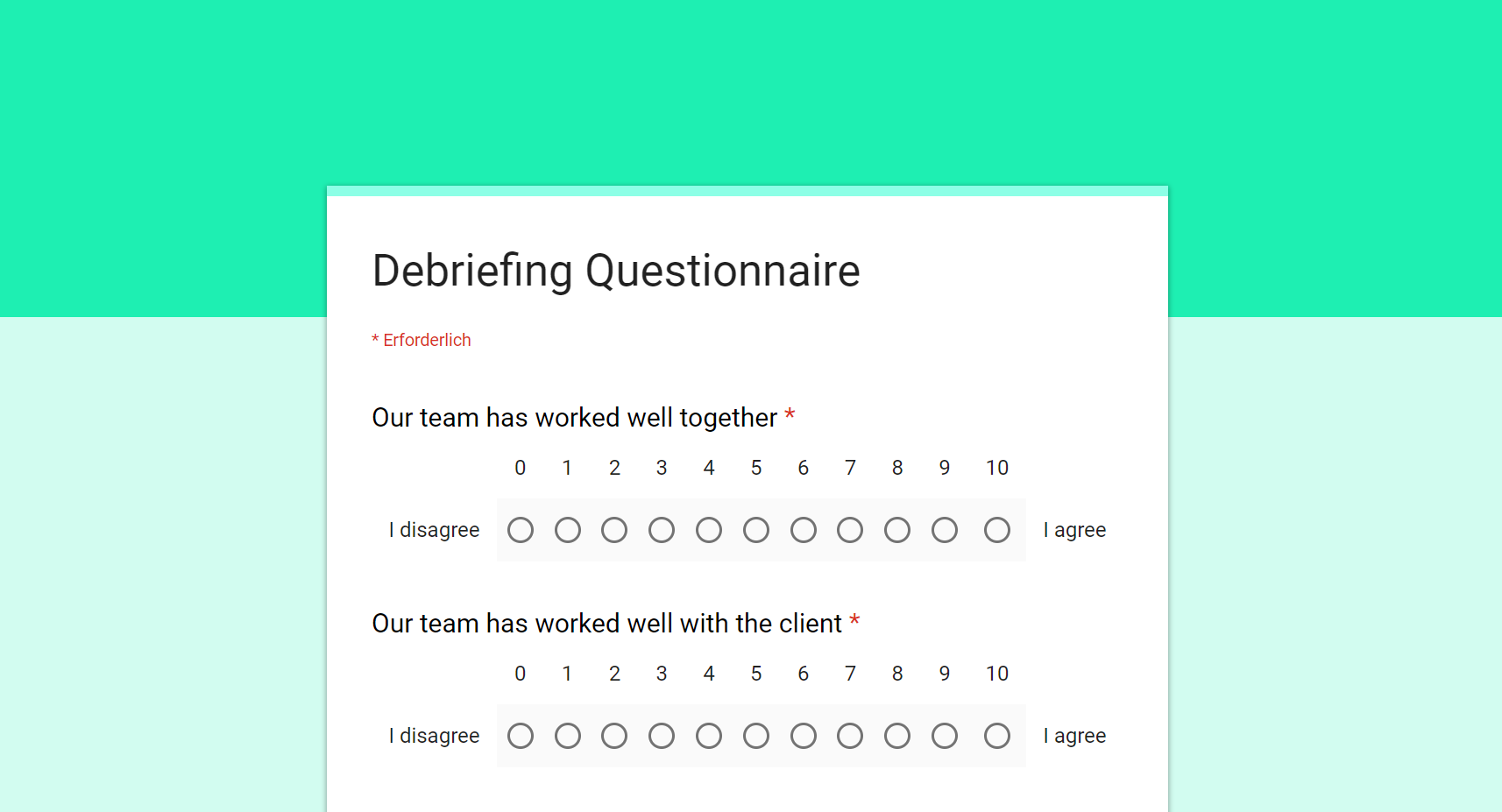Have you ever had that numb feeling in your stomach when you realized you made the same mistake twice? Sure, who doesn't know that? It can drive you crazy. How nice it would be to avoid these mistakes in the future......
We will show you how to learn more efficiently from successes and mistakes with debriefings and how to complete the next project more successfully!

What is debriefing?
Many air forces around the world hold a debriefing after every exercise and mission, in order to learn from mistakes immediately. In the air, every mistake can have fatal consequences.
In project portfolio management, debriefings are crucial as they provide a structured and systematic review of completed projects. They offer valuable insights into what worked well, what could be improved, and lessons learned. By analyzing these debriefings, organizations can enhance their project management processes, make informed decisions for future projects, and optimize resource allocation. Debriefings contribute to continuous improvement, risk mitigation, and overall efficiency in managing a portfolio of projects.
In a debriefing 3 simple questions are asked, which are more about facts and less about emotions.
- What exactly has happened? Only facts, no evaluation. It is about negative as well as positive things.
- Why did it happen?
- What would I (or we) do differently next time? An appropriate to-do list is drawn up from this, which can also be understood and applied by others.
Why shouldn't you take a leaf out of this book and get a clearer picture of the last project?
Scott Tannenbaum and Christopher Cerasoli examined 46 debriefing studies and found a 25% average performance improvement through debriefing.
Advantages of debriefing
Debriefings have much more advantages than just ring down the curtain on the project.
- It encourages fact-based learning and not blaming
- The experiences of the whole team are shared and help to avoid mistakes in the future
- Team communication is trained and strengthened
- The view for the "complete picture" is sharpened. Awareness of the complexity of the project or organisation is raised.
Even if the military origin of debriefings may deter at first glance, it is also a very effective way to constantly work on oneself and on teamwork. The second goal of a debriefing is to understand the reasons for successes and setbacks from past projects and to draw up feasible measures for the future. So the next project will run more smoothly and successfully.
5 steps to successful debriefing
1. Set a date for debriefing
At best, the debriefing should be part of the project planning and take place as soon as possible after project completion. When little time passes, the impressions are as fresh as possible.
2. Send a Debriefing Questionnaire
A few days before the meeting takes place, you should send a questionnaire to all participants about the course of the project. This will encourage everyone to reflect on the project. Also, the preparation time for everyone is automatically reduced because they are guided from question to question.

3. Define basic rules
Debriefing is a meeting where problems are openly discussed. A positive working atmosphere is needed for the debriefing to be successful. It is a fine line to discuss or complain about a situation. These rules should make it easier to start debriefing.
- Be constructive, not destructive. Name the problem and focus on the solution
- Don't get personal. It's not about passing the blame on to someone, but about mastering challenges and finding solutions for the future
- Everyone should have the chance to describe their point of view and propose solutions
- Respect the position of others.
Make sure debriefing is a place where team members can express their honest opinions without being judged.
4. Prepare and send agenda
You can use the results from the questionnaire to set up the agenda. As with any meeting, it is advisable to send an agenda to all participants beforehand. This way you do not have to present the agenda at the beginning of the meeting and everyone will have the opportunity to better prepare for the meeting.
The agenda for the debriefing could look like this:
Evaluation of the situation
- Were the project objectives achieved?
- Is the customer satisfied with the result?
- Were measures not completed?
Analysis / Discussion
- What went well / bad?
- Have we underestimated / overestimated something?
- Should we therefore stop / establish certain processes?
Measures
- immediate measures
- medium-term measures
5. The debriefing
It's not what you say, but how you say it
Plan 5 minutes at the beginning of the meeting for a little small talk to relax the mood. As soon as it starts, remember what it's all about: Constructiveness.
It's not about blaming someone, it's about finding ways to improve the organization and the team..
Review of the project
This is about facts. In order to understand the project, you first have to get an overview.
Analysis
Identify the causes of success and failure.
This is the most important part of debriefing. But also the most tricky part if the participants are not yet familiar with this format.
To start an open discussion, start talking about a mistake you have made.
Lesson learned
Derive concrete measures from your analysis so that your team can reproduce successful processes in the future and avoid mistakes that were made. However, do not overdo it with the number of measures so that they can be implemented during ongoing operations.
The protocol
A secretary records everything. In addition, you can record important points on a whiteboard or flip chart. The minutes and measures should be sent to all participants as soon as possible after the meeting.
Extra Tips
Set a target time
At some point, every discussion begins to revolve around itself. To keep the meeting compact, you should set a maximum length for the debriefing.
Don't expect miracles
We're all just human beings. The first debriefings will certainly not run smoothly. Self-defence, resistance, insults... to recognize one's own weaknesses is the best way to grow.
Project perfectly completed? Nevertheless, debrief!
You can learn just as much from a success as from your mistakes. Debriefing is less about the meeting itself than about a culture of reflection.
If you are genuinely interested in new views, the initial effort of planning and conducting a debriefing is worthwhile. Fresh ideas in all possible directions may otherwise remain hidden.
Good luck - and have fun - with your first debriefing!
If you are interested in managing your project portfolio with as little effort as possible, you should take a look at Falcon.

